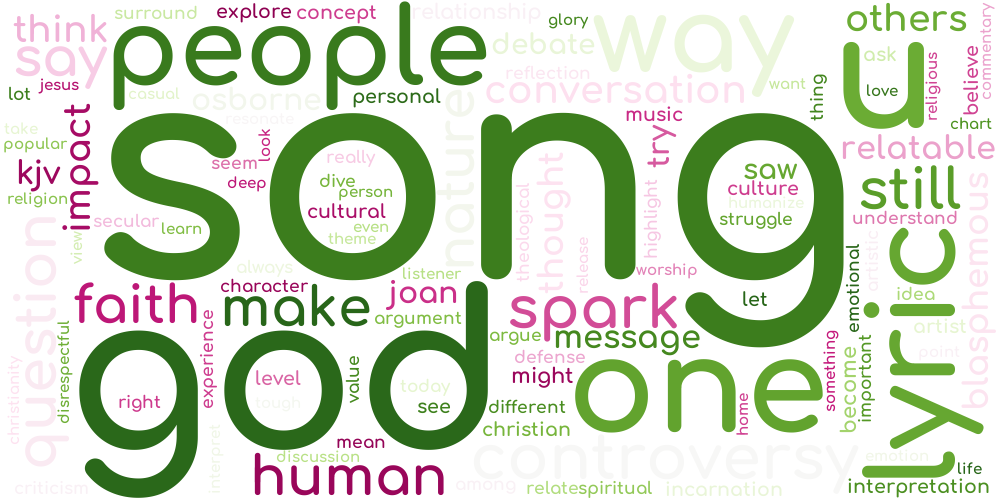Key Takeaways
- “One of Us” is a song by Joan Osborne, released in 1995, which sparked controversy due to its lyrics that questioned God’s nature and behavior.
- The song’s lyrics, “What if God was one of us? Just a slob like one of us, trying to make his way home?” were seen as blasphemous by some Christians.
- The song’s writer, Eric Bazilian, intended to spark a conversation about God’s relationship with humanity, rather than to offend or blaspheme.
- The controversy surrounding the song led to it being banned by some radio stations and sparking debates about artistic freedom and religious sensitivity.
- Despite the controversy, “One of Us” became a huge commercial success, reaching the top 10 on the US Billboard Hot 100 chart.
- The song’s impact on popular culture was significant, with Mary Ellen Wagner, PhD, a Catholic scholar, noting that it reflected a growing trend of questioning traditional religious authority in the 1990s.
Introduction
Brief History of the “What if God was one of us” Song
Do you remember that iconic song from the 90s, “One of Us” by Joan Osborne? It was a huge hit, but it also sparked a lot of controversy. Released in 1995, the song’s lyrics asked some pretty deep questions about God and faith.
| Year | Event |
|---|---|
| 1995 | “One of Us” by Joan Osborne is released as a single. |
| 1996 | The song peaks at number 4 on the US Billboard Hot 100 chart. |
Overview of the Controversy Surrounding the Song
So, what was the big deal about this song? The lyrics asked some tough questions about God, like “What if God was one of us?” and “Just a slob like one of us?” Some people saw it as a blasphemous attack on Christianity, while others saw it as a thought-provoking exploration of faith.
- Misinterpretation: Some people thought the song was making fun of God or reducing Him to a human level.
- Deep questions: Others saw it as a genuine attempt to explore the nature of God and faith.
Purpose of the Article
In this article, we’ll dive into the controversy surrounding “One of Us” and explore what we can learn from it. We’ll examine the lyrics, the backlash, and what it says about our faith. We’ll also look at what the Bible has to say about God’s nature and how we can apply that to our everyday lives.
As C.S. Lewis once said, “God whispers to us in our pleasures, speaks to us in our conscience, but shouts to us in our pain.” Let’s take a closer look at what this song can teach us about our faith and our relationship with God.
Let’s start with this thought-provoking word cloud, which visually emphasizes the core elements of our discussion.

Word cloud by BibleBreathe.com about what if god was one of us controversy
The Origin of the Controversy

Photo modified by BibleBreathe.com. Original photo by Dome Dussadeechettakul on Pexels
The Original Lyrics of the Song
Have you ever stopped to think about the lyrics of a song before it becomes a huge hit? I mean, really think about them? That’s what we’re going to do with the song “One of Us” by Joan Osborne. The lyrics that sparked the controversy are: “What if God was one of us? Just a slob like one of us, trying to make his way home?” Seems harmless, right?
The Interpretation of the Lyrics
But here’s the thing: people started interpreting those lyrics in different ways. Some thought it was a clever way to imagine God as a regular person, while others saw it as blasphemous. I mean, who are we to say what God is like, right? Is it possible to relate to God on a human level? Or is that just a bit too bold?
| Interpretation | Reasoning |
|---|---|
| Humanizing God | The song encourages us to think about God in a more relatable way. |
The Public’s Reaction
So, how did the public react to this song? Well, it was a mixed bag. Some people loved the song and saw it as a thought-provoking reflection on God’s nature. Others were outraged, calling it heresy. It’s interesting to see how people react when their views on God are challenged. What do you think?
As Alan Moore, a famous comic book writer, once said, “Questioning everything, all the time, is hard. Thinking things through for yourself is always very strenuous.”
The Theological Implications
The Idea of God Becoming Human
Let’s dive into the concept of God becoming human.
It’s a mind-blowing idea, right? I mean, the Creator of the universe taking on human form? It’s a pretty radical thought.
But, as Christians, we believe that’s exactly what happened in Jesus Christ.
“And the Word was made flesh, and dwelt among us, (and we beheld his glory, the glory as of the only begotten of the Father,) full of grace and truth.” (John 1:14, KJV)
The Concept of Incarnation in Different Religions
Now, the idea of incarnation isn’t unique to Christianity.
Other religions, like Hinduism and Buddhism, have similar concepts.
| Religion | Concept of Incarnation |
|---|---|
| Hinduism | Avatars, like Krishna and Rama, are believed to be incarnations of gods. |
| Buddhism | The concept of “emanation” refers to the manifestation of a deity or enlightened being. |
The Implications of the Song on Theology
So, what does the song “One of Us” imply about God?
Here are a few things:
- God is relatable: The song’s lyrics suggest that God is someone we can identify with, someone who understands our struggles.
- God is humble: The idea of God becoming human implies a level of humility, a willingness to take on our form and experience our limitations.
- God is mysterious: The song’s lyrics also touch on the mysterious nature of God, highlighting the complexity of His character.
“For my thoughts are not your thoughts, neither are your ways my ways, saith the Lord.” (Isaiah 55:8, KJV)
The song “One of Us” might be a bit unconventional, but it raises some interesting questions about God’s nature.
The Cultural Significance

Photo modified by BibleBreathe.com. Original photo by Pixabay on Pexels
The Impact of the Song on Popular Culture
“One of Us” by Joan Osborne was more than just a catchy tune – it sparked a national conversation about God and faith.
The song’s lyrics, which asked questions like “What if God was one of us?” and “Trying to make His way home,” resonated with people from all walks of life.
It’s not every day that a song about God makes it to the top of the charts, but this one did.
| Chart | Peak Position |
|---|---|
| Billboard Hot 100 | 4 |
| US Alternative Songs | 2 |
The Role of the Song in Religious Discussions
The song’s impact on religious discussions was significant.
It got people talking about God in a way that was relatable and accessible.
The song’s message of a personal God who is “trying to make His way home” struck a chord with many.
- Clergy and theologians weighed in on the song’s themes and lyrics.
- Christian radio stations played the song, sparking debate and discussion among listeners.
- Secular media outlets covered the song’s impact on popular culture.
The Influence of the Song on Contemporary Music
The song’s influence on contemporary music can still be felt today.
- Christian artists like Switchfoot and Relient K have cited the song as an inspiration.
- Secular artists like Lady Gaga and Katy Perry have explored themes of spirituality and faith in their music.
- Worship music has become more mainstream, with artists like Hillsong United and Chris Tomlin achieving widespread success.
“Music is the divine way to tell beautiful, poetic things to the heart.” – Pablo Casals
The Criticisms of the Song
The Arguments Against the Song’s Message
Let’s dive into the controversy surrounding “One of Us”.
Some people think the song’s message is too casual, too humanizing, or even blasphemous.
They argue that God is not like us, and we shouldn’t try to make Him seem that way.
But is that really what the song is saying?
| Criticism | Counterpoint |
|---|---|
| The song makes God seem too human | But doesn’t the Bible say God became human in Jesus? (John 1:14, KJV) |
| The song’s message is too casual | Isn’t God a God of relationships, not just rules? (Matthew 22:37-40, KJV) |
The Theological Criticisms
Some theologians argue that the song’s message is theologically inaccurate.
They say that God’s sovereignty and omnipotence are compromised by the song’s lyrics.
But what if the song is trying to highlight God’s relatability and empathy instead?
“For we have not an high priest which cannot be touched with the feeling of our infirmities; but was in all points tempted like as we are, yet without sin.” (Hebrews 4:15, KJV)
The Cultural Criticisms
Others criticize the song for being too focused on human emotions.
They argue that God’s character and attributes are more important than our feelings.
But isn’t it possible to balance both?
Can’t we acknowledge God’s greatness while also exploring our own emotions and struggles?
“The glory of God is man fully alive.” – Irenaeus
The Defense of the Song

Photo modified by BibleBreathe.com. Original photo by cottonbro studio on Pexels
The Arguments in Support of the Song’s Message
So, what’s the big deal about “One of Us” by Joan Osborne?
Some people might say it’s just a song, but others see it as a way to spark meaningful conversations about God.
Here are some arguments in support of the song’s message:
- It’s a thought-provoking question: If God were one of us, would we even recognize Him?
- It’s a commentary on our society: We often expect God to be some distant, unapproachable figure, but what if He’s more relatable than we think?
- It’s a reflection of our own struggles: We’ve all wondered what God’s like, and this song just puts those thoughts into words.
The Theological Defenses
From a theological standpoint, some people might say that the song is too casual or disrespectful towards God.
But others argue that it’s actually a reflection of God’s character:
- God is a God of relationships: He wants to connect with us on a personal level, just like we do with our friends.
- God is a God of questions: He’s not afraid of our doubts and uncertainties, and He wants us to seek Him out.
- God is a God of humility: He’s not some distant, unapproachable figure, but a loving Father who wants to be close to us.
The Cultural Defenses
Culturally speaking, the song “One of Us” was a game-changer when it came out.
It sparked conversations about God and faith in a way that was relatable and accessible to people who might not have been interested otherwise.
Here are some cultural defenses of the song:
| Cultural Impact | How the Song Relates |
|---|---|
| Secular vs. Sacred | The song blurs the lines between secular and sacred, making God more relatable. |
| Pop culture and faith | The song shows that faith can be a part of pop culture, not just something separate. |
“For in him we live, and move, and have our being; as certain also of your own poets have said, For we are also his offspring.” (Acts 17:28, KJV)
The Legacy of the Controversy
The Long-term Impact of the Controversy
Let’s talk about the aftermath of the “One of Us” controversy.
It’s been a while since the song was released, but its impact still lingers.
The controversy sparked a lot of conversation and debate about God’s nature and how we relate to Him.
Some people saw the song as a way to make God more relatable, while others thought it was disrespectful to humanize Him.
| Argument | Impact |
|---|---|
| Made God more relatable | Encouraged people to think about God in a more personal way |
The Song’s Continued Relevance
Fast forward to today, and the song is still widely popular.
People are still singing along to the lyrics, and the message is still resonating with many.
So, what makes this song so timeless?
Here are three reasons:
- It asks the right questions: The song poses some tough questions about God’s nature and our relationship with Him. These are questions that people are still grappling with today.
- It’s honest about our struggles: The song acknowledges the doubts and fears that we all face. This honesty is something that people can really relate to.
- It points to a deeper truth: The song may not have all the answers, but it points to the fact that God is still with us, even in the midst of uncertainty.
“Be still, and know that I am God: I will be exalted among the heathen, I will be exalted in the earth.” (Psalm 46:10, KJV)
The Lessons Learned from the Controversy
So, what can we learn from the “One of Us” controversy?
Here are three key takeaways:
- Conversation is key: The controversy sparked a lot of conversation about God and faith. This conversation is still happening today, and it’s an important part of our spiritual growth.
- Reverence is important: The controversy highlighted the importance of reverence in worship. This is something that we should always keep in mind when we’re thinking about God.
- God is still God: Despite all the controversy and debate, God is still God. He’s still sovereign, still loving, and still with us.
As C.S. Lewis once said, “You don’t have a soul. You are a soul. You have a body.” This is a great reminder that our spiritual lives are just as important as our physical ones.
The Interpretation of the Song

Photo modified by BibleBreathe.com. Original photo by Anna Pou on Pexels
The Different Interpretations of the Lyrics
Let’s dive into the controversy surrounding “One of Us”.
The song’s lyrics have sparked a lot of debate, with some people seeing it as a deeply spiritual song, while others view it as blasphemous.
| Interpretation | Description |
|---|---|
| Spiritual | Some see the song as a reflection on God’s nature and humanity’s relationship with Him. |
| Blasphemous | Others believe the song demeans God’s character by portraying Him as a regular person. |
The Role of Personal Beliefs in Interpreting the Song
So, why do people interpret the song in such different ways?
It all comes down to our personal beliefs and experiences.
Our upbringing, culture, and faith all shape how we understand the lyrics.
For example, if you grew up in a conservative Christian household, you might be more likely to see the song as blasphemous.
On the other hand, if you’re from a more liberal background, you might view the song as a thought-provoking commentary on social issues.
The Importance of Understanding the Context of the Song
To truly understand the song, we need to look at the context in which it was written.
The song’s writer, Eric Bazilian, has said that the song is about questioning God’s nature and humanity’s relationship with Him.
He’s not trying to be blasphemous, but rather spark a conversation about what it means to be human and to believe in God.
“For my thoughts are not your thoughts, neither are your ways my ways, saith the Lord.” (Isaiah 55:8, KJV)
The Artistic Value of the Song
The Musicality of the Song
“One of Us” by Joan Osborne is more than just a catchy tune – it’s a masterpiece of musical storytelling.
The song’s haunting melody and poignant lyrics have captivated listeners for decades, and its ** Grammy nominations** are a testament to its artistic value.
| Musical Element | How it Contributes to the Song’s Artistic Value |
|---|---|
| Haunting melody | Creates a sense of longing and introspection |
| Poignant lyrics | Explores complex themes and emotions |
The Emotional Impact of the Song
The song’s emotional impact is undeniable – it’s a cathartic experience that resonates with listeners on a deep level.
The lyrics ask tough questions about God’s nature and human existence, and the song’s soaring vocals convey a sense of yearning and seeking.
- Have you ever felt like you’re searching for answers, but they’re just out of reach?
- Have you ever wondered if God is really there, or if it’s all just a myth?
The song’s emotional impact is a testament to its artistic value – it’s a powerful exploration of the human experience.
The Significance of the Song in the Artist’s Career
“One of Us” was a game-changer for Joan Osborne, catapulting her to fame and cementing her status as a singer-songwriter.
The song’s success was a career highlight, and it remains one of her most beloved and enduring songs.
“The highest art is always the most religious, and the greatest artist is always a devout person.” – Abraham Lincoln
Frequently Asked Questions About What If God Was One Of Us Controversy
What is the ‘What If God Was One of Us’ Controversy?
The ‘What If God Was One of Us’ controversy surrounds the 1995 song by Joan Osborne, which sparked debate about blasphemy and disrespect towards God. Critics argued the lyrics were irreverent and challenged traditional Christian beliefs, while others saw it as a thought-provoking exploration of faith and humanity.
What Are the Arguments For and Against the ‘What If God Was One of Us’ Controversy?
The ‘What If God Was One of Us’ controversy, sparked by Joan Osborne’s song, raises questions about God’s nature and humanity. Proponents argue it encourages empathy and understanding, while critics see it as blasphemous, diminishing God’s divinity. Others argue it’s a thought-provoking exercise, sparking important discussions about faith and spirituality.
How Has the ‘What If God Was One of Us’ Controversy Influenced Popular Culture?
The ‘What If God Was One of Us’ controversy, sparked by Joan Osborne’s 1995 song, has influenced popular culture by inspiring introspective discussions about faith and spirituality. It has also paved the way for more nuanced and questioning representations of religion in media, such as in TV shows and films that explore complex moral themes.
{
“@context”: “https://schema.org”,
“@type”: “FAQPage”,
“mainEntity”: [
{
“@type”: “Question”,
“name”: “What is the ‘What If God Was One of Us’ Controversy?”,
“acceptedAnswer”: {
“@type”: “Answer”,
“text”: “The ‘What If God Was One of Us’ controversy surrounds the 1995 song by Joan Osborne, which sparked debate about blasphemy and disrespect towards God. Critics argued the lyrics were irreverent and challenged traditional Christian beliefs, while others saw it as a thought-provoking exploration of faith and humanity.”
}
},
{
“@type”: “Question”,
“name”: “What Are the Arguments For and Against the ‘What If God Was One of Us’ Controversy?”,
“acceptedAnswer”: {
“@type”: “Answer”,
“text”: “The ‘What If God Was One of Us’ controversy, sparked by Joan Osborne’s song, raises questions about God’s nature and humanity. Proponents argue it encourages empathy and understanding, while critics see it as blasphemous, diminishing God’s divinity. Others argue it’s a thought-provoking exercise, sparking important discussions about faith and spirituality.”
}
},
{
“@type”: “Question”,
“name”: “How Has the ‘What If God Was One of Us’ Controversy Influenced Popular Culture?”,
“acceptedAnswer”: {
“@type”: “Answer”,
“text”: “The ‘What If God Was One of Us’ controversy, sparked by Joan Osborne’s 1995 song, has influenced popular culture by inspiring introspective discussions about faith and spirituality. It has also paved the way for more nuanced and questioning representations of religion in media, such as in TV shows and films that explore complex moral themes.”
}
}
]
}
Matt Turner
I’m Matt, and I love breaking down Bible verses in a way that’s easy to understand and apply to everyday life. My goal is to help you connect with God’s Word and find practical ways to live it out. Whether you’re new to the Bible or just looking for some fresh insights, I’m here to walk with you and share what I’ve learned along the way.

